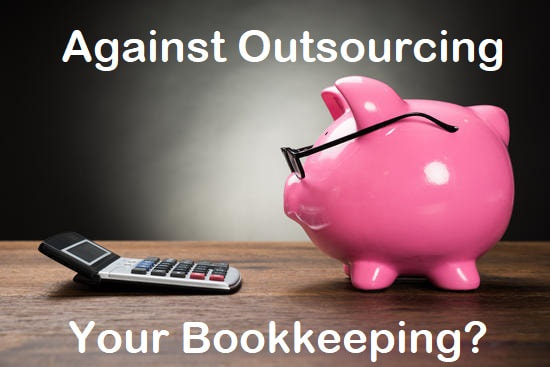In Pursuit of Profit
Read our expert article below or sign up to get articles sent to your inbox.
 There are plenty of resources about the benefits of outsourcing, yet many business owners are still resistant to outsource their bookkeeping. Even businesses that outsource other activities tend to keep a tight grasp on their financial functions. Because cash flow is so important to small businesses, bookkeeping and accounting tend to be some of the last functions that business owners are willing to relinquish control of when they formulate strategic growth plans. But why? Why are some business owners still against outsourcing their bookkeeping?  Cloud accounting is accounting software that allows you to keep the books online for your business. Financial data is encrypted and then hosted on a remote server instead of in-house for greater accessibility. With cloud accounting software (sometimes referred to as “online accounting software” or “web-based accounting software”) data is saved to the cloud and accessed by users on demand. In a nutshell, Users subscribe to an online accounting software solution and move their books to the cloud. From then on, they can access their accounts from any web browser, or from an app on their phone. Most users connect the software to their business bank account, so that banking transactions flow automatically from the bank to the books. This saves them from a lot of data entry. Some accounting software companies, like QuickBooks, have both desktop and online versions, while other companies offer only cloud-based options. The QuickBooks cloud-based software, QuickBooks Online, remains one of the most widely used accounting platforms year after year. However, companies like Xero, Zoho, Wave, FreshBooks, GoDaddy, 17hats have been growing in popularity recently.
While widespread accessibility is the primary reason companies choose to use cloud accounting software, there are many benefits to consider when determining whether cloud accounting is right for you.  How is your bookkeeper doing right now? Is your bookkeeper focused and able to do high-quality work, or stuck in the weeds and struggling to keep up with business demands? Bookkeeper burnout is extremely common because bookkeepers are often asked to do more than their job description would indicate that they should be handling. This is especially true at small businesses, where everything including the kitchen sink is often thrown at bookkeepers because there are just not enough employees to do everything. Professional burnout leads to carelessness and poor-quality work, which is especially dangerous when the work is managing the company’s finances. Burnout among bookkeepers can lead to errors, sloppy work, and missed deadlines that can jeopardize ongoing cash flow and future profitability. The best way to avoid overwhelming your bookkeeper is to have a strictly defined role and stick to it, hiring additional personnel to handle other tasks where needed. So, what should be included in your bookkeeper’s duties and what should not?  Recent data shows that on average employees change jobs every 15 months. Contributing to this turnover is a lack of employee satisfaction in the workplace. Globally, 85% of employees are unhappy at work, resulting in diminished productivity and increased employee churn. Furthermore, survey data shows that 40% of dissatisfied employees change jobs as a result of their dissatisfaction. Top employers understand that replacing employees is expensive and can thwart efforts to innovate and grow revenue. In fact, it can cost up to a third of an employee’s salary to find a replacement. And while employee turnover can cost a company greatly, employee retention can increase profits as well as provide a host of other benefits. Reducing costs and boosting revenue makes employee retention a win-win. Improve employee retention rates this year by investing in your employees in six critical ways: |
SUBSCRIBE:DOWNLOAD:DOWNLOAD:Categories:
All
Archives:
July 2024
|
Services |
Company |
|
1/25/2021